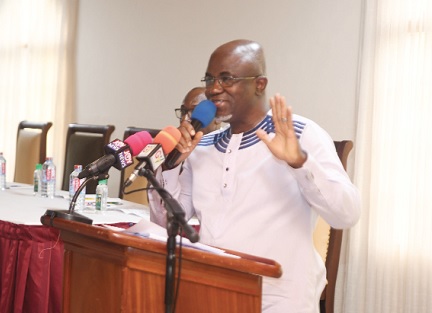![]()

Collaboration key to halve road crashes by 2030 — NRSA
The Board Chairman of the NRSA, Jermaine Nkrumah, who made that call, said although there had been modest gains in reducing road crashes, injuries and deaths (CIDs) over the last 15 months, more work needed to be done to make the roads safer.
Advertisement
In that regard, he stressed the need for the Motor Traffic and Transport Department (MTTD) of the Ghana Police Service and the Driver and Vehicle Licensing Authority (DVLA) to strengthen enforcement regimes to ensure that drivers adhere to road traffic regulations.
He also urged operators of commercial vehicles and motorbike riders to adhere strictly to road traffic regulations to prevent road crashes.
Stakeholders meeting
Mr Nkrumah made the call at a meeting with stakeholders in the road sector in Accra on April 20.
The stakeholders meeting, which was organised by the NRSA in collaboration with CUTS International, brought together key actors in the road sector such as the MTTD of the Ghana Police Service, transport operators such as the Ghana Road Transport Coordinating Council (GRTCC), Ghana Private Road Transport Union (GPRTU), Metro Mass Transit (MMT), Intercity STC Coaches Limited, Motor Riders Association of Ghana, Road Safety Management Services Limited (RSMSL) and other partners.
The participants discussed the road safety situation in the country, the status of the Stay Alive road safety campaign, compliance with the road safety operation standards, new strategies for the removal of breakdown vehicles, advocacy for drivers’ blood alcohol concentration (BAC) level and other key issues within the road safety space.
Reduction in crashes
For the past 15 months, the NRSA has made modest gains in reducing road CIDs in the country.
The latest statistics by the NRSA revealed that deaths from road crashes reduced from 734 in the first quarter of last year to 544 within the same period this year.
The figure represents a 25.9 per cent decline in road crash deaths within the period.
Additionally, the number of vehicles involved in crashes reduced from 3,932 in 2022 to 3,340 in 2023, representing a decline of 13.1 per cent.
In terms of injuries, the number reduced from 4,035 in 2022 to 3,697, representing a decline of 8.4 per cent.
More work
Mr Nkrumah noted that while the decline in CIDs between 2022 and 2023 was encouraging, the NRSA and its stakeholders needed to work hard to consolidate the gains made so far.
"We are happy that we have saved almost 200 lives in the first quarter of 2023 than we did in 2022.
But we must also be aware that within the same period, 544 families had to organise funerals for their dead; children became orphans, so we cannot be happy with this. Even if one person dies, we should be worried," he said.
He stressed the need for the stakeholders to work together "until we record zero deaths".
For his part, the Director-General of the NRSA, David Osafo Adonteng, said the authority would deepen collaboration with other stakeholders to reduce carnage on the road.
While commending other stakeholders such as the MTTD, the DVLA and the transport unions for helping to reduce crashes, he urged them to continue playing their roles well to bring sanity to the roads.
The West African Regional Director of CUTS International, Appiah Adomako, highlighted the need for the government, through the Ministry of Transport to revise the BAC level downward to conform with global best practices.
He explained that drink-driving constitutes about 10 per cent of total crashes in the country.
“Ghana’s BAC level is pegged at 0.08mg/ml. Research shows that at this level, drivers are impaired in terms of their driving ability.
The World Health Organisation (WHO) recommends that countries lower their BAC levels to 0.05mg/ml to save lives and reduce road incidents and crashes,” he said.
He further called on all road users to be disciplined and adhere to road safety regulations to stay alive and reduce road crashes.





